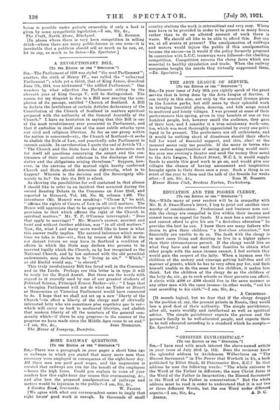SOME RAILWAY QUESTIONS.
[To THE EDITOR Or IRE " SPECTATOR."]
Sia,—There was a paragraph in your paper a short time ago re railways in which you stated that many more men than necessary were employed in consequence of the eight-hour day. All these men are paid good wages, and the impression is created that railways are run fer the benefit of the employees —hence the high fares. Could you explain to some of your readers how this eight-hour day causes this overmanning, &c., and also how the proposed amalgamation of railways and motors would be injurious to the public?—I am, Sir, &c.,
3 Gordon Road, Sevenoaks. W. FRANKS. [We agree with what our correspondent seems to imply that eight hours' good work is enough. In thousands of small
country stations the work is intermittent and very easy. Where men have to be provided in order to be present so many hours rather than to do an allotted amount of work there is waste. We should all like to be able to afford this. But can we, at all events at present? The amalgamation of railways and motors would injure the public if this amalgamation became the excuse—as it would if the policy formerly proposed In connexion with L.C.C. tramways were followed—for checking competition. Competition ensures the cheap fares which are essential to healthy circulation and trade. When the railway companies bought the canals they virtually suppressed them. —En. Spectator.]


































 Previous page
Previous page